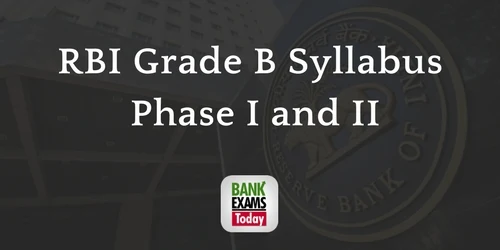Today I am providing the RBI Grade B syllabus. Under new the scheme of selection the examination will be computer-based (Objective type with Multiple Choice Question pattern) and consists of two phases, viz.,
- Phase-I
- Phase-II
- Interview

Syllabus for Phase I
|
Quantitative Aptitude |
Reasoning |
General Awareness |
English Language |
|---|---|---|---|
|
Data Interpretation |
Statement and Assumptions |
Current Affairs |
Reading Comprehension |
|
Number Series |
Seating Arrangement |
Dams/ Power plants/ National Parks |
Para-jumbles |
|
Data Sufficiency |
Puzzles (Floor Based/ Month Based) |
Organizations, Heads, and Headquarters |
Sentence-connectors |
|
Partnership |
Syllogism |
Books and Authors |
Double Fillers |
|
Time and Work |
Data Sufficiency |
Cabinet Ministers and their Constituency |
Idioms and Phrases |
|
Percentage |
Machine Input/ Output |
Countries - Capital/ Currency |
Vocabulary based questions |
|
Simplification |
Blood Relation |
Famous Waterfalls/ Rivers/ Bridges/ Hill/ Tribes/ Mountain Peaks |
Error Spotting |
|
Time Speed and Distance |
Direction Sense Test |
Stadiums and Museum |
Match the sentences |
|
Ratio and Proportion |
Coding-Decoding |
Games-Venue/ Host Countries |
|
|
Simple/ Compound Interest |
Statement & Assumption/ Arguments |
Summits and Conferences |
|
|
Dates and Days |
Syllabus for Phase-II exam
Paper-I - Economic and Social Issues (ESI):
Growth and Development
- Measurement of growth
- National Income and per capita income
- Poverty Alleviation and Employment Generation in India
- Sustainable Development and Environmental issues.
Indian Economy
- Economic History of India
- Changes in Industrial and Labour Policy, Monetary and Fiscal Policy since reforms of 1991
- Priorities and recommendations of Economic Survey and Union Budget
- Indian Money and Financial Markets: Linkages with the economy
- Role of Indian banks and Reserve Bank in the development process
- Public Finance
- Political Economy
- Industrial Developments in India
- Indian Agriculture
- Services sector in India.
Globalization
- Opening up of the Indian Economy
- Balance of Payments
- Export-Import Policy
- International Economic Institutions
- IMF and World Bank
- WTO
- Regional Economic Cooperation
- International Economic Issues
Social Structure in India
- Multiculturalism
- Demographic Trends
- Urbanisation and Migration
- Gender Issues
- Social Justice: Positive Discrimination in favor of the underprivileged
- Social Movements
- Indian Political System
- Human Development
- Social Sectors in India
- Health and Education.
Paper-II -English (Writing Skills):
RBI Grade B Course by Ramandeep Singh
Video class + Test series + Quizzes
Take a Demo
+91-9067201000
Paper-III - Finance and Management:
a) Financial System
- Regulators of Banks and Financial Institutions
- Reserve Bank of India- functions and conduct of monetary policy
- Banking System in India – Structure and concerns, Financial Institutions – SIDBI, EXIM Bank, NABARD, NHB, etc, Changing the landscape of the banking sector.
- Impact of the Global Financial Crisis of 2007-08 and the Indian response
b) Financial Markets
- Primary and Secondary Markets (Forex, Money, Bond, Equity, etc.), functions, instruments, recent developments.
c) General Topics
- Risk Management in Banking Sector
- Basics of Derivatives
- Global financial markets and International Banking – broad trends and latest developments.
- Financial Inclusion
- Alternate source of finance, private and social cost-benefit, Public-Private Partnership
- Corporate Governance in Banking Sector, the role of e-governance in addressing issues of corruption and inefficiency in the government sector.
- The Union Budget – Concepts, approach and broad trends
- Inflation: Definition, trends, estimates, consequences, and remedies (control): WPI, CPI - components and trends; striking a balance between inflation and growth through monetary and fiscal policies.
- FinTech
d) Management:
- Fundamentals of Management & Organizational Behaviour: Introduction to management; Evolution of management thought: Scientific, Administrative, Human Relations and Systems approach to management; Management functions and Managerial roles; Nudge theory.
- Meaning & concept of organizational behavior; Personality: meaning, factors affecting personality, Big five model of personality; the concept of reinforcement; Perception: concept, perceptual errors.
- Motivation: Concept, importance, Content theories (Maslow’s need theory, Alderfer's ERG theory, McCllelands’ theory of needs, Herzberg’s two-factor theory) & Process theories (Adams equity theory, Vroom's expectancy theory).
- Leadership: Concept, Theories (Trait, Behavioural, Contingency, Charismatic, Transactional and Transformational Leadership; Emotional Intelligence: Concept, Importance, Dimensions. Analysis of Interpersonal Relationship: Transactional Analysis, Johari Window; Conflict: Concept, Sources, Types, Management of Conflict;
- Organizational Change: Concept, Kurt Lewin Theory of Change; Organizational Development (OD): Organisational Change, Strategies for Change, Theories of Planned Change (Lewin’s change model, Action research model, Positive model).
- Ethics at the Workplace and Corporate Governance: Meaning of ethics, why ethical problems occur in business.
- Theories of ethics: Utilitarianism: weighing social cost and benefits, rights and duties, Justice and fairness, ethics of care, integrating utility, rights, justice and caring, An alternative to moral principles: virtue ethics, teleological theories, egoism theory, relativism theory,
- Moral issues in business: Ethics in Compliance, Finance, Human Resources, Marketing, etc.
- Ethical Principles in Business: introduction, Organization Structure and Ethics, Role of Board of Directors, Best Practices in Ethics Programme, Code of Ethics, Code of Conduct, etc.
- Corporate Governance: Factors affecting Corporate Governance; Mechanisms of Corporate Governance Communication: Steps in the Communication Process; Communication Channels; Oral versus Written Communication; Verbal versus non-verbal Communication; upward, downward and lateral communication; Barriers to Communication, Role of Information Technology.


